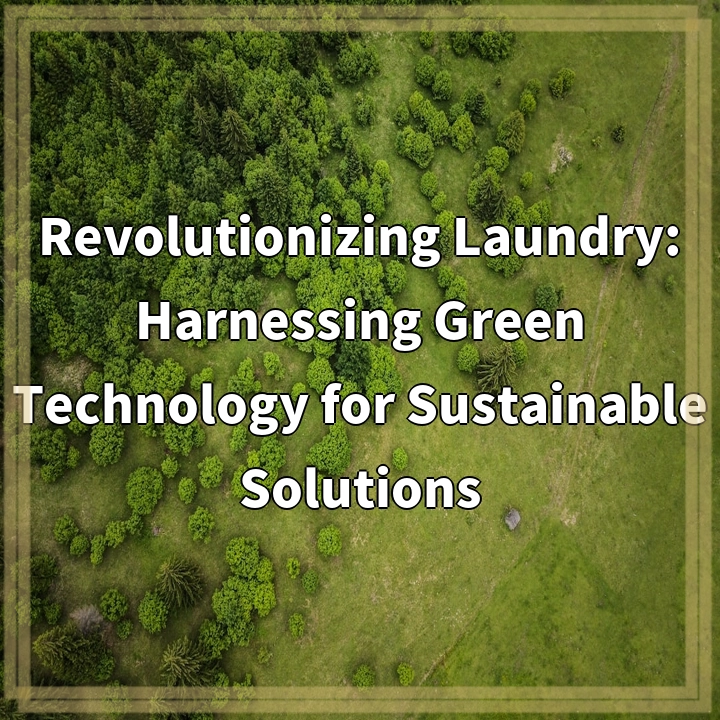
What it is:
Laundry is an essential part of our lives, but it also has a significant environmental impact. Traditional laundry practices involve the use of large amounts of water, energy, and chemical-laden detergents, contributing to pollution and resource depletion. To address these issues, the concept of green technology in laundry solutions has emerged. Green technology refers to innovative and eco-friendly approaches that aim to minimize the environmental footprint of laundry processes.
Real-world problems:
1. Water Consumption: Traditional laundry machines consume substantial amounts of water per load, which not only leads to wastage but also puts pressure on water resources. The excessive use of water can be especially problematic in areas experiencing water scarcity or drought conditions.
2. Energy Consumption: Laundry machines also consume a significant amount of energy, primarily through heating water and operating the washing and drying cycles. This energy consumption contributes to greenhouse gas emissions and increases the demand for fossil fuels.
3. Chemical Pollution: Conventional laundry detergents often contain harsh chemicals, such as phosphates and artificial fragrances, which can be harmful to both the environment and human health. These chemicals can find their way into water bodies and contribute to water pollution, affecting aquatic ecosystems.
4. Textile Waste: The fashion industry is one of the largest contributors to textile waste, including clothing and other fabric-based items. Laundry practices can further contribute to this problem when garments are discarded or replaced prematurely due to damage caused by harsh washing processes.
5. Consumer Awareness: One of the challenges associated with revolutionizing laundry with green technology is the lack of consumer awareness. Many individuals are not informed about the environmental impact of their laundry practices and are not aware of the available sustainable alternatives.
By addressing these real-world problems through the implementation of green technology in laundry solutions, we can work towards creating a more sustainable and environmentally friendly approach to doing laundry.

Solutions for Revolutionizing Laundry with Green Technology:
There are several solutions available to address the real-world problems associated with laundry and promote sustainable practices. These solutions aim to minimize water and energy consumption, reduce chemical pollution, minimize textile waste, and increase consumer awareness.
1. Water-Efficient Machines:
Utilizing water-efficient washing machines can significantly reduce water consumption during laundry processes. These machines use advanced technologies such as low-flow mechanisms, sensors, and optimized water levels to ensure efficient water usage without compromising on cleanliness.
2. Energy-Efficient Appliances:
Choosing energy-efficient laundry appliances is crucial to reduce the environmental impact of laundry processes. Energy Star certified machines consume less energy, utilize advanced technologies for improved efficiency, and offer features like cold-water washing options to minimize energy consumption.
3. Eco-Friendly Detergents:
Switching to eco-friendly detergents can help reduce chemical pollution. Look for plant-based or biodegradable laundry detergents that are free from phosphates, artificial fragrances, and other harmful chemicals. These detergents are gentle on the environment, and some are even packaged in recycled or refillable containers.
4. Gentle Laundry Practices:
Implementing gentle laundry practices can extend the lifespan of garments and minimize textile waste. This includes washing clothes in cold water, air-drying when possible, using lower spin speeds, and choosing gentle cycles for delicate fabrics. Additionally, repairing and upcycling clothes can help minimize the need for new purchases.
5. Consumer Education and Engagement:
Increasing consumer awareness about the environmental impact of laundry practices is crucial. Education campaigns, online resources, and community engagement initiatives can help inform individuals about the importance of sustainable laundry and promote the adoption of green technologies. Consumer choices and behaviors have the power to drive industry-wide change.
By implementing these solutions, individuals, households, and businesses can contribute to revolutionizing laundry practices and reducing the environmental footprint associated with this everyday task.















